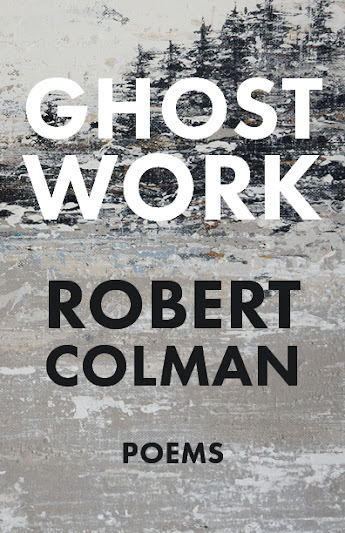Robert Colman, Ghost Work: Poems
In the Ribs of the Whale
Before weeding Penguinsand pulp fiction for the Sally Ann, my sister photographs his den. So manybooks. aspiration. Was there a goal, once, beyond connection? I pick out aGerman primer, Bertrand Russell’s short fictions, a guide to coastal birds ofthe United States. When did the world seem so knowable? My sister covets histeak desk, but it is anchor, not answer, Churchillian without a voicebox;outside the carapace of shelves, just some wayward sailor, landlocked, thepewter ashtray his spirit lamp. Selected wisdoms are now their own animal,wandering. When I read to him from its rows he joins me in snatches of poetry,lifts the book from my hand, turns it, caresses, cautiously riffling the pages,recalling his own face.
“I used to own this,” hesays.
 I’mintrigued by Newmarket, Ontario poet Robert Colman’s fourth full-lengthcollection,
Ghost Work: Poems
(Windsor ON: Palimpsest Press, 2024), “asuite of poems that explores a son’s gradual loss of his father from dementia.”The loss of a parent is one of those universal experiences, one poets have beenarticulating and exploring for as long as poems have existed, and thefirst-person narratives of Colman’s latest collection around the slow erosionof his father offers lines and phrases set with subtle force, a striking easeand the most delicate care. “This walk is not ruined by absence— / loss comeseasy to the cedars,” he writes, to close the short poem “To Test an Absence,” “birchpeel and its sticky skin / that tests memory’s rule, what we hope / we cantrust as we walk above / on what seems like solid ground.” This is a book ofghosts, made more difficult for the slow erosion of his father’s selfthroughout dementia (comparable, in certain ways, to my own father’s slowphysical erosion due to amyotrophic lateral sclerosis). In the poem “Name,” Colmanwrites on regularly calling his father “father,” so as to remind him theirrelationship, a poem striking and heart-wrenching for that simple and ongoingdetail. “I run on as if words could shape an anchor,” he writes, “shape afather unoccluded, riven of doubt.” And yet, I find Colman’s more compellingpoems are the ones where he approaches his subject at a bit of an angle,allowing the language to propel, over the poems set to articulate a particular bitof information. “Tonight we char wild boar,” he writes, as part of the six poemsequence “Lost on the Way to Tortosa,” “aflame in tree boles. Yet here in theash, / mockingly, new growth. // This is the flicker he misses, the nonsensespark. / I hear him, an ocean away, testing a tune.”
I’mintrigued by Newmarket, Ontario poet Robert Colman’s fourth full-lengthcollection,
Ghost Work: Poems
(Windsor ON: Palimpsest Press, 2024), “asuite of poems that explores a son’s gradual loss of his father from dementia.”The loss of a parent is one of those universal experiences, one poets have beenarticulating and exploring for as long as poems have existed, and thefirst-person narratives of Colman’s latest collection around the slow erosionof his father offers lines and phrases set with subtle force, a striking easeand the most delicate care. “This walk is not ruined by absence— / loss comeseasy to the cedars,” he writes, to close the short poem “To Test an Absence,” “birchpeel and its sticky skin / that tests memory’s rule, what we hope / we cantrust as we walk above / on what seems like solid ground.” This is a book ofghosts, made more difficult for the slow erosion of his father’s selfthroughout dementia (comparable, in certain ways, to my own father’s slowphysical erosion due to amyotrophic lateral sclerosis). In the poem “Name,” Colmanwrites on regularly calling his father “father,” so as to remind him theirrelationship, a poem striking and heart-wrenching for that simple and ongoingdetail. “I run on as if words could shape an anchor,” he writes, “shape afather unoccluded, riven of doubt.” And yet, I find Colman’s more compellingpoems are the ones where he approaches his subject at a bit of an angle,allowing the language to propel, over the poems set to articulate a particular bitof information. “Tonight we char wild boar,” he writes, as part of the six poemsequence “Lost on the Way to Tortosa,” “aflame in tree boles. Yet here in theash, / mockingly, new growth. // This is the flicker he misses, the nonsensespark. / I hear him, an ocean away, testing a tune.”


